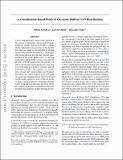A classification-based study of covariate shift in GAN distributions
Author(s)
Madry, Aleksander; Schmidt, Ludwig; Santurkar, Shibani
DownloadAccepted version (2.345Mb)
Open Access Policy
Open Access Policy
Creative Commons Attribution-Noncommercial-Share Alike
Terms of use
Metadata
Show full item recordAbstract
© 35th International Conference on Machine Learning, ICML 2018.All Rights Reserved. A basic, and still largely unanswered, question in the context of Generative Adversarial Networks (GANs) is whether they are truly able to capture all the fundamental characteristics of the distributions they are trained on. In particular, evaluating the diversity of GAN distributions is challenging and existing methods provide only a partial understanding of this issue. In this paper, we develop quantitative and scalable tools for assessing the diversity of GAN distributions. Specifically, we take a classification-based perspective and view loss of diversity as a form of covariate shift introduced by GANs. We examine two specific forms of such shift: mode collapse and boundary distortion. In contrast to prior work, our methods need only minimal human supervision and can be readily applied to state-of-the-art GANs on large, canonical dataseis. Examining popular GANs using our tools indicates that these GANs have significant problems in reproducing the more distributional properties of their training dataset.
Date issued
2018Department
Massachusetts Institute of Technology. Computer Science and Artificial Intelligence Laboratory; Massachusetts Institute of Technology. Department of Electrical Engineering and Computer ScienceCitation
Madry, Aleksander, Schmidt, Ludwig and Santurkar, Shibani. 2018. "A classification-based study of covariate shift in GAN distributions."
Version: Author's final manuscript